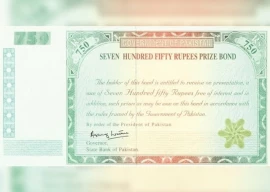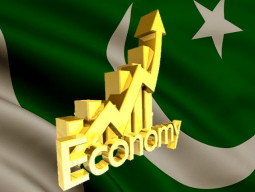Interestingly, the Great Recession did not touch China, India and Brazil because their financial sectors were either state-controlled or highly regulated. In fact, the economies of the three kept expanding over the last six years, as the economies of the purely capitalist countries kept shrinking. Even Pakistani banks had remained untouched all along by the Great Recession because of strict enforcement of banking regulations by the State Bank of Pakistan. Despite this, Pakistan’s economy had remained in the doldrums all these years because of escalating waves of terrorism sweeping across the country and the mounting power shortages. Indeed, in recent years, Pakistan has become one of the world’s riskiest, as well as the least attractive destinations for foreign investment. Local investment is also drying up for the same reasons. There is no quick fix solution for either terrorism or power shortage. But as we await their resolution, we need, at the same time, to kick-start the economy because a serious slowdown in economic growth would only further fuel terrorism and further widen the gap between power supply and its demand.
And the best way to kick-start the economy is to make investments in projects producing the commodity in greatest demand in the country — electricity. But fossil fuel-fired power has proved to be our undoing because most of our fossil fuel requirement is imported and therefore, we are forced to subsidise at least half of the doorstep cost of per unit of electricity. Therefore, the never-ending circular debt. Hydel power has been known to be the most economical cost-wise. In Khyber-Pakhtunkhwa (K-P) alone, there are scores of hydel sites, which can be exploited for short-gestation power projects with relatively smaller investment and by using appropriate indigenous technologies. In view of the prevailing investment climate, it would be too optimistic to expect the private sector to take the risk and that, too, in the most militancy-infested province. Moreover, our own experience, and also that of most developing countries, has shown that private sector involvement in power generation and its transmission have only pushed electricity out of the reach of most of the population, including the middle classes. So, there is a compelling reason for the state to enter the business of generating electricity. In fact, it is not only the power sector in which the state needs to invest but also in other utilities, as well as in those sectors considered indispensable for promoting long-term economic growth.
Here is an appropriate quote from an erudite book, The impact of privatisation in Pakistan, by Dr Akhtar Hasan Khan, former secretary planning: “In economic policies, there is no room for dogma or theology. Neither a totally private enterprise approach nor a completely public enterprise approach can yield the optimum results. China did not follow a doctrinaire approach. It opened its economy to foreign investment and a large sector of the economy was run on free market principles. On the other hand, vital sectors like banking, infrastructure, etc. were all publicly owned and managed.” The question is, in these days of extreme resource crunch, where does the government get the funds from for financing, to start with, the already identified K-P hydel projects? No harm in printing notes to kick-start the economy. But better still, let our champion fundraiser take the initiative. Imran Khan is one man, who not only Pakistanis, but many the world over trust with their money. Let him pass the hat around for contributions for launching the K-P hydel projects under his personal supervision.
Published in The Express Tribune, July 31st, 2013.
Like Opinion & Editorial on Facebook, follow @ETOpEd on Twitter to receive all updates on all our daily pieces.
COMMENTS (8)
Comments are moderated and generally will be posted if they are on-topic and not abusive.
For more information, please see our Comments FAQ
1736930668-0/Untitled-design-(97)1736930668-0-405x300.webp)
1736931444-0/BeFunky-collage-(51)1736931444-0-165x106.webp)

1736929668-0/Untitled-design-(96)1736929668-0-165x106.webp)







1732012115-0/Untitled-design-(14)1732012115-0-270x192.webp)
1736844405-0/Express-Tribune-(2)1736844405-0-270x192.webp)










In the light of your assertion, why, then, in spite of State bank regulation, a dollar makes Rs 104, now, Rs. 4 more within a month of taking over by the new PML-N government?
Clutching at straws and passing the hat around? This is not the time to fool ourselves with false hopes. It is time to prepare for the worst.
Author is so mistaken about the nature of free market economies.
A free-market isn't an unregulated market. The problems that happened in US & some parts of Europe is lack of appropriate regulation to safeguard investors. And also, that of abdication of regulatory/policy responsibility of the govt.
Free Markets indeed work much better than govt. controlled economies. The reason why Govt. controlled economies appear to have escaped recession, is because the picture is never clear. It is no wonder that Govt. controlled economies are found across the world in poor countries (i.e. low income countries). If they need to get to the status of high income countries they need to stop being managed by govt.
Countries which continue to have a large manufacturing base relative to services, such as Germany, were also not affected seriously by the International Financial Crisis.
I do not agree with the writer that Pakistan is not spending on power. In fact Pakistan is spending huge sums on power, military power! Last recession has impacted most countries of the world but it affected most growing economies to a lesser extent. Even the slow rate of growth in China is several times better than that in the US and Europe in general.
Contrary to the authors observation, China, Indian, Brazil and most emerging markets have felt (and are still feeling) the brunt of the financial crisis. The growth rate of their economies can be considered 'disappointing' in comparison to its potential growth rate.
eye opener.
Northern Rock nationalised in 2008 not 2009. Brazil growth has collapsed over the last few years, so has in India, China's growth has fallen to 7.7% as the "great rebalancing" starts. What are you talking about? On the other hand, Canada and Australia were hardly affected by the recession, and shale gas has led to boom of sorts in the US.